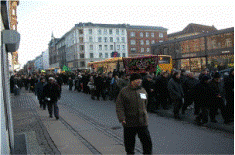Migration and Social Mobility
Migration has been an important area of research since the 1980s. A significant part of this research has focused on the Global South, and research projects are currently being carried out in Latin America, the Caribbean, West Africa, India and the Philippines. A key theme in this research is mobility as a social, economic and cultural resource in the dynamic tension between envisaged and actualized migration. Early studies have examined, in particular, migration to classical migration destinations in large North American and European metropoles, but recent research has also focused on newer migration routes, e.g. between countries in the global south or from Eastern Europe, Asia and West Africa to urban, suburban or rural areas of Denmark. Different kinds of migration are also being investigated, such as the “educational migration” of international students, au pairs or interns from the post-colonial and post-socialist world; the undocumented migration flows from West Africa to Europe; trafficking from Africa and Eastern Europe, and the return migration of skilled Indian professionals. A key topic in this research has been the nature of the extended social networks that enframe many migrants’ lives, with all the expectations, opportunities, obligations and constraints that this entails. Research has adopted a transnational theoretical approach, but with an emphasis upon the perspectives of the migrants, rather than those of the recipient countries. New methodological approaches, such as trans-local fieldwork in global networks and on migration routes, as well as historical ethnographies, have also been applied.
In parallel with this more globally oriented fieldwork, integration research examining the situation of immigrants and refugees in Denmark has emerged as an important topic. A key theme has been the extensive socio-cultural integration system that has been developed within the Danish welfare society. Fieldwork in e.g. asylum centers, educational institutions, language centers and various treatment and health centers has shown a tendency for the integration system to focus on the newcomers’ lack of Danish cultural competencies, rather than the personal resources they offer to Danish society. This research has therefore also contributed to the exploration of the cultural perceptions and social practices connected with Danish institutions and the Danish welfare society as a whole. In recent years, several projects have combined more globally inspired migration research with Danish-oriented integration research. This has resulted in investigations into the significance of global relations in local integration processes, and into integration as an analytical concept and political project.
Contact person: Karen Fog Olwig
Migration and Social Mobility boks

Peruvian migrants celebrate a Catholic saint in a procession in Washington DC. (Photo: Karsten Pærregaard)

Ashura Procession, Copenhagen. (Photo: Marianne Holm Pedersen)
